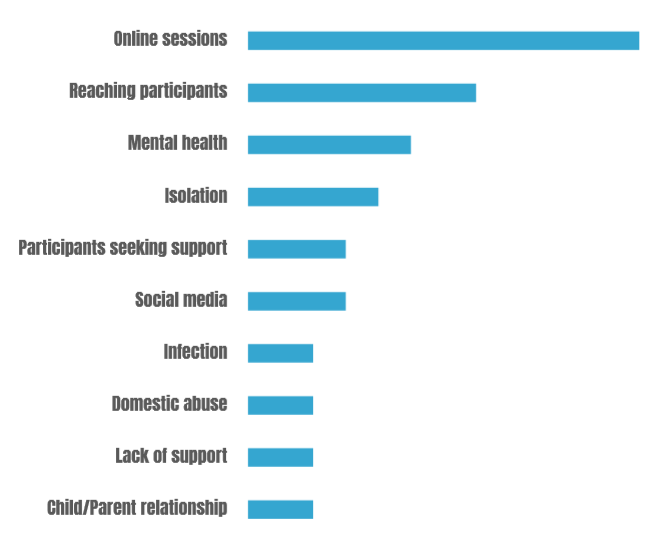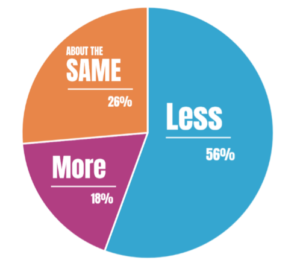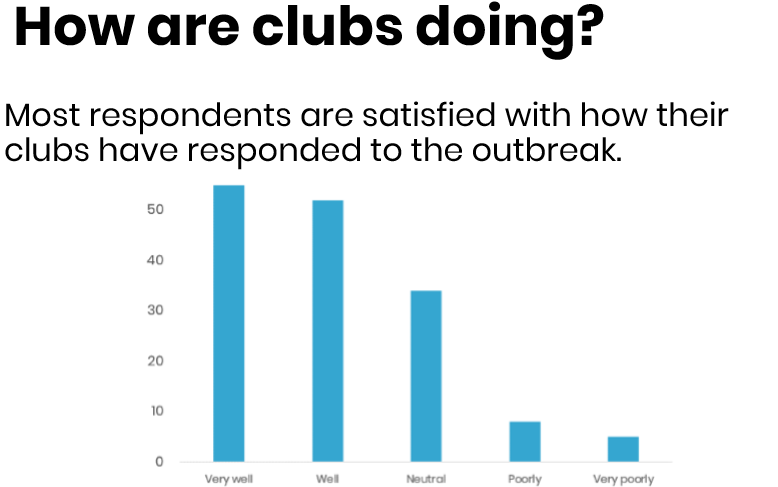
During April and May, we worked with Sport England to design two surveys to explore how the sport sector was responding to the pandemic.
The surveys were either completed by sport and activity organisations, or by sport participants.
- 82 sport and activity organisations completed the Sports Organisation Survey.
- 504 sport participants completed the Sport & Activity Participant Survey.
Survey Aims
The surveys aimed to gain information on how to help sports and activity organisations respond to the outbreak by:
- Exploring organisations’ struggles and concerns
- Hearing from participants’ experiences and how the outbreak is affecting them
- Identifying gaps in safeguarding information and resources
The Sports and Activity Organisation Survey
We asked a range of questions to explore how sport and activity organisations were responding to the pandemic.
Below, we discuss the findings from survey with sport and activity organisations.
Have you considered safeguarding issues for new activities?
Most organisations had considered the safeguarding issues and implications of new activities they may have introduced during the coronavirus outbreak.
Have you made changes to your safeguarding policy?
While almost 70% of organisations had considered the safeguarding impact of new challenges, only 22% have, or are in the process of, making changes to their policy.
Sport Organisations Top 10 Safeguarding Challenges of Covid-19

What have we learnt from these challenges?
The information below indicates some useful considerations for how those working or volunteering in the sport sector can respond to these challenges.
Online session processes
- Consider what platform will you use to deliver training or sessions online.
- What kind of sessions will you run (activity-based or social-based)?
- How often will you run them?
- Who will be invited to join and how will you invite them?
- How can you keep participants safe?
- How can you ensure that only members of the club will be able to access online session?
- Have you considered a code of conduct for staff, volunteers and participants during online sessions?
Collecting contact details and consent
- Do you/will you collect contact details?
- How will you collect details safely and securely?
- How will you gain consent for you to contact participants?
- In what way will you contact participants – and will you give them the option to choose?
Ensuring Participants feel supported
- How will you communicate the name/contact information of safeguarding lead?
- How will you explain what issues they can help with and when?
- How often will you remind participants of this (and will that increase upon closure/further lockdowns)?
Social Media Policy
- What social media platforms do you use?
- How do you use them? – e.g. closed groups, open pages.
- Who can connect and how?
- How to deal with social media-related issues (safeguarding and other)?
Infection control and protection
- What measures should you have in place for Covid-19?
- Will you introduce further preventative measures in case of future outbreaks?
- Will you add new procedures and hygiene standards e.g. during flu-season?
- Sport England have produced useful guidance on maximising hygiene as sport and activity resumes.
Planning for Lack of Support
- If staff and volunteers are furloughed or unavailable, what are the options?
- Who takes on responsibilities of furloughed staff? If a safeguarding lead is furloughed, who would step in?
- How to respond if social services or the council isn’t available? Who would support you?
- It is important to have a back up plan if support is not available.
The Participant Survey
Alongside surveying sport and activity organisations, we were also keen to hear about the experiences of people that participate in sport and activity.
The participant survey explored the experiences of 504 respondents from a representative sample of the UK population.
Survey Aims
The participant survey aimed to explore participants views to inform practice going forward. The survey asked sport and activity participants:
- How has lockdown affected them?
- How have sports and activity clubs performed?
- What could they do better?
Activity Levels
Over half of respondents were exercising less during lockdown. Although in Wales, respondents reported that they were exercising more.
- Moderately active respondents have been most effected, with nearly 70% exercising less.
- Inactive respondents have had the least impact with the highest proportion of people exercising at the same level.
- Active participants had the highest level of people exercising more that unusual.

Have you received information from your club?
Of the participants who identified as part of a sport and activity club or group, over a quarter told us they haven’t had any communication during the coronavirus outbreak.
Given that sport and activity organisations are crucial in noticing signs of harm or abuse, it is important that sports and activity organisations maintain contact with participants in challenging times.

What can clubs do?
Most requests and suggestions from participants can be summarised into the following categories:
- Communication
- Online sessions & encouraging activity
- Tips, ideas & challenges
- Advice & guidance

Communication
“We get regular updates on how the horses are through a whatsapp group”
One participant, who was part of an equestrian club, was pleased to be sent regular updates and photographs of the horses during lockdown.
- Consider sending motivational quotes and messages of encouragement to participants.
- Don’t over-promise on how often you will be communicating with participants.
- Keep participants up to date.
- Don’t forget the social aspect.
- Keep contact details for participants up to date so that you can maintain contact.
- Consider that not everyone has internet access. How can you communicate with participants off-line?
Moving Online
“Community video calls, with quiz nights, bingo nights and other activities so the group stays close”
- Keep any online slots and classes regular.
- Try to make online sessions available later so people can take part in their own time.
- Video guides or sessions can be a flexible alternative.
- Online sessions can be fun, sociable activities, offered as well as sport and activity classes.
- Take some inspiration from Flyerz Hockey, who have been using the Spice Girls and designing housework workouts for participants during lockdown.
- Try sending postcards or leaflets to communicate with people who are unable to join online activities.
Tips, Ideas and Challenges
“One thing I’m wary of is finding routes where you can cross the road to dodge people… so maybe sharing route ideas that provide the most space/visibility?”
- Provide inspiration and ideas for at-home and individual workouts.
- It is not just about sending information online; it can be sending information out in booklets via post so people without internet can continue to access sport and activity.
- Set up regular home challenges – with incentives!
- Recommend or even provide equipment if it’s not being used within your organisation.
Advice and guidance
“While kayaking is not specifically excluded I have seen it questioned by police.”
- Ensuring participants have clear advice about what is appropriate in the current government guidelines and being mindful of localised lockdowns where rules may differ to national advice.
- Distribute clear advice on what is permissible in the current rules.
- Provide specific training and exercise plans to keep up fitness.
The future
These findings should help inform:
- Covid-19 – second wave, the new normal and beyond.
- Future crisis planning and procedures (potential outbreaks and other issues).
- Participant engagement and responsibilities when activities are closed or postponed (e.g. off-season)
- Recognising the social aspect of sport and activity and it’s importance to participants
What are Ann Craft Trust doing to help?
- We have set up #ACTSafeguardingHour. Join us every Wednesday 12pm to 1pm on Twitter. Just add the hashtag and we’ll answer your question or share your practice during the hour.
- We have been creating our Safeguarding Matters podcasts to discuss topical safeguarding issues.
- We’ve created a set of Covid-19 specific resources.
- Our blog features new articles and advice.
- Sign up to the Monthly Safeguarding Adults in Sport Email Update to be kept up to date.
What is happening in the wider sport sector?
- Kent Sport have developed user friendly resources for identifying and minimising risks for online activity and also returning to activity, including top tips and safeguarding checklists.
- Club Matters have a guide on how sports clubs can run a survey to explore the needs of their own participants that is coronavirus specific.
- Club Matters are interested in finding about how participants and volunteers feel about going back to a club or group setting. Let them know by completing their survey.
- Sport England have created lots of advice about returning to sport and activity as lockdown eases.
- UK Youth have provided guidance about safely delivering online sessions for young people.
- The CPSU have published guidance about safeguarding children in sport as lockdown eases.
Safeguarding Adults in Sport Online Course
We have a range of safeguarding adults eLearning courses to help you learn more about safeguarding adults and learn how to recognise the signs of abuse, including our Safeguarding Adults in Sport course. Perfect for volunteers, safeguarding leads and welfare officers.
Safeguarding Adults in Sport eLearning Courses
